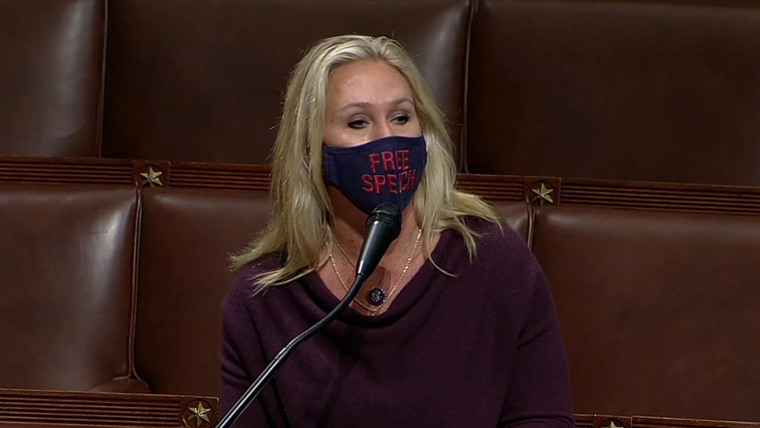WASHINGTON — The new chairman of the Democratic Congressional Campaign Committee, said Thursday that Democrats feel compelled to call out fringe elements of the GOP, even if it means drawing more attention to Rep. Marjorie Taylor Greene, R-Ga., and others.
“It might elevate her, but we need to warn people about the dangerous takeover by these QAnon radicals of the Republican caucus,” Rep. Sean Patrick Maloney told NBC News. “This is not some caricature. This is about where the power is right now in the Republican caucus.”
But Maloney said he’s unmoved by critics worried he’s raising the profile of extremists, saying that the fringe had was already taken over that the GOP leaders are “either too weak or too cowardly to do anything about it.”
Maloney is trying to drive a QAnon wedge between the GOP and suburban voters with an early salvo of TV ads charging vulnerable GOP lawmakers of siding with former President Donald Trump, the rioters who stormed the Capitol on Jan.6 and Q — the name of the alleged source behind the bogus QAnon conspiracy theory.
And the Democratic-controlled House took the extraordinary step Thursday of forcing Republicans to take a vote on stripping Greene of her committee assignments, pressuring them to choose between potentially alienating their base on one side or swing voters on the other.
Democrats know they’ll face headwinds defending their narrow majority in 2022 and see this early strategy as way to try to retain the Trump tarnish on the GOP brand and keep their own base engaged.
“It’s going to be a hard sell for Republicans to grow their party if they have to tell their friends that they’re going back to a party that’s now run by kooks, wackadoos and nutjobs,” said Jesse Ferguson, a Democratic operative.
“We’ve had a big increase in the number of people looking to run for Congress who have been energized by the threat” after the riot,” Maloney said.
It’s a familiar playbook and similar to the one Republicans successfully used last year to tie Democrats to unpopular left-wing policies like defunding the police.
The first round of Democratic ads, for instance, targeted some moderates like Reps. Brian Fitzpatrick, R-Pa., a former FBI agent, and Maria Elvira Salazar, R-Fla., a former journalist because their districts make them politically vulnerable — but both voted to strip Greene of her committees.
But some worry all the attention ends up making fringe ideas and figures more powerful, noting Democrats were initially giddy when Trump entered the 2016 GOP primary, expecting he would bring down the rest of the Republican field.
“Saturation coverage of and endless attacks on an offensive, conspiracy-promoting, lib-owning, line-crossing populist already brought us one dangerous and unqualified president,” Brendan Nyhan, a Dartmouth professor who has studied the intersection of the conspiracy theories and the media, said on Twitter.
Greene’s name recognition has shot up amidst a flood of media attention and she’s raised at least $1.6 million off calls for her expulsion from Congress, a similar trajectory to the ones of former GOP lawmakers like Michelle Bachmann and Steve King, who capitalized on criticism.
Denver Riggleman, a former Republican member of Congress who was ousted by a right-wing challenger last year, is a vocal opponent of QAnon’s influence in his party. But he worried that accusing the entire GOP of supporting the conspiracy theory could become a “self-fulfilling prophecy” by squeezing moderates into either embracing or rejecting part of their base.
“I think it’s good politics for the Democratic Party to run this in some of these districts, but I think it’s bad for the country,” he said.
Source: | This article originally belongs to Nbcnews.com



















